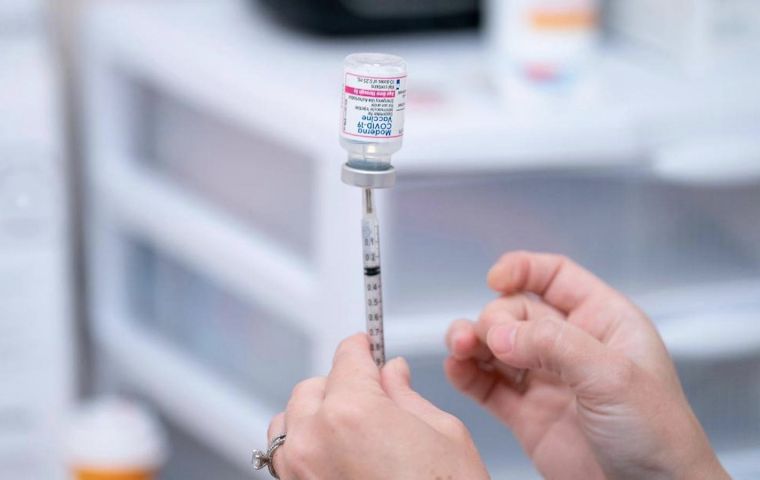MercoPress. South Atlantic News Agency
Nearly 20 million lives saved by Covid-19 vaccines, study shows
 “It was clear early on that global vaccine equity would be the only way out of the pandemic,” Watson said
“It was clear early on that global vaccine equity would be the only way out of the pandemic,” Watson said Scientists from Imperial College London have released a study explaining that COVID-19 vaccines have saved nearly 20 million lives during their first year of existence, although more could have been achieved had international targets been met.
Nearly two-thirds of the world's population has had at least one COVID-19 vaccine.
Since the first dose was administered Dec. 8, 2020, in England, over 4.3 billion have been vaccinated despite persisting inequalities. “Catastrophic would be the first word that comes to mind,” said Imperial College London's Oliver Watson, had vaccines not been available.
“Our findings offer the most complete assessment to date of the remarkable global impact that vaccination has had on the COVID-19 pandemic,” said lead author Dr. Oliver Watson, who noted that almost 7.5 million of the deaths prevented in the first year of vaccination were in countries covered by the COVID-19 Vaccine Access initiative (COVAX).
“This initiative was set up because it was clear early on that global vaccine equity would be the only way out of the pandemic,” Watson said. An additional 599,300 deaths could have been prevented if the World Health Organization (WHO) had hit its target of vaccinating 40% of the population in every country by the end of 2021, the study showed.
The researchers used data from 185 countries to estimate that vaccines prevented 4.2 million COVID-19 deaths in India, 1.9 million in the United States, 1 million in Brazil, 631,000 in France, and 507,000 in the United Kingdom. An additional 600,000 deaths would have been prevented if the World Health Organization target of 40% vaccination coverage by the end of 2021 had been met, according to the study published Thursday in The Lancet Infectious Diseases.
The finding that 19.8 million COVID-19 deaths had been prevented was based on estimates of how many more deaths than usual occurred during the time period. Using only reported COVID-19 deaths, the same model yielded 14.4 million deaths averted by vaccines. The study excluded all considerations regarding China because of the uncertainty around the pandemic’s effect on deaths there and its huge population.
In the first year of vaccination, researchers estimated that 19.8 million of a potential 31.4 million deaths were prevented. About 12.2 million prevented deaths were in high- and upper-middle-income countries.
The researchers also left aside any consideration into how the virus might have mutated in the absence of vaccines or how lockdowns or mask-wearing measures might have changed if vaccines were not available.
Another modeling group used a different approach to estimate that 16.3 million COVID-19 deaths were averted by vaccines. That work, by the Institute for Health Metrics and Evaluation in Seattle, has not been published yet.
In the real world, people wear masks more often when cases are surging, said the institute’s Ali Mokdad, and 2021’s delta wave without vaccines would have prompted a major policy response. “We may disagree on the number as scientists, but we all agree that COVID vaccines saved lots of lives,” Mokdad said.
The findings underscore both the achievements and the shortcomings of the vaccination campaign, said Adam Finn of Bristol Medical School in England, who like Mokdad was not involved in the study. “Although we did pretty well this time — we saved millions and millions of lives — we could have done better and we should do better in the future,” Finn said.
Funding for the development of vaccines came from several groups including the WHO; the UK Medical Research Council; Gavi, the Vaccine Alliance; and the Bill and Melinda Gates Foundation.




Top Comments
Disclaimer & comment rulesCommenting for this story is now closed.
If you have a Facebook account, become a fan and comment on our Facebook Page!